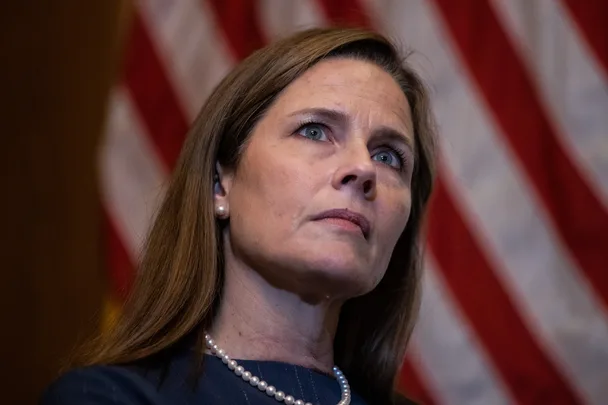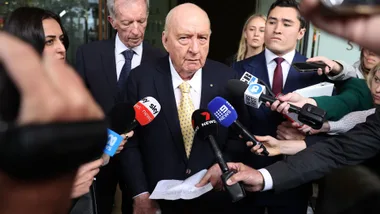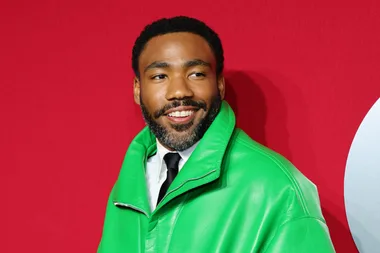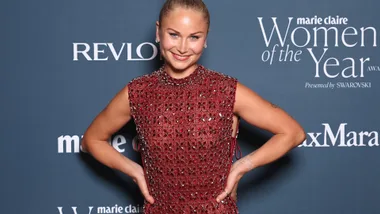We may not see the direct impact in a day or a month or even a year from now, but make no mistake: allowing President Donald Trump to nominate Seventh Circuit U.S. Court of Appeals Judge Amy Coney Barrett to the Supreme Court—when people across the country have already begun casting their ballots for the general election on November 3, 2020—will alter the course of our nation for decades to come.
The Republican-led Senate’s opposition to President Obama’s Supreme Court nomination in 2016—citing an election year—and pushing for President Trump’s Supreme Court nomination fewer than 36 days away from Election Day proves that precedent no longer matters to Republicans. Senate Judiciary Chairman Lindsey Graham (R-SC) reportedly plans to hold confirmation hearings for Coney Barrett the week of October 12, and Senate Majority Leader Mitch McConnell (R-KY) will likely hold a vote on the Senate floor soon after.
Should Coney Barrett, a religious conservative, win the majority of the votes in the Senate—and she likely will, unless Senator Susan Collins (R-ME), Senator Lisa Murkowski (R-AK), and two other Republican senators vote “no”—President Trump will have nominated three people to the Supreme Court during his time in office, transforming the highest court in the land into a group of majority conservative-leaning justices that will affect the livelihoods of millions of Americans. In the rare case that the vote does not happen before Election Day, Joe Biden has the chance to nominate a liberal judge should he win the 2020 election.
Below, we’ve outlined some of the main issues at stake should Coney Barrett’s nomination pull through.
Health Care
The most timely issue Americans will face if Coney Barrett is confirmed to the Supreme Court is the future of the Affordable Care Act (ACA), otherwise known as Obamacare. The Supreme Court is scheduled to have oral arguments on the ACA the week of November 10, following the Trump administration’s claims that the mandates in the act are unconstitutional. Should the Supreme Court declare the ACA unconstitutional, 20 million Americans will lose their health care in the middle of a global pandemic, including 12 million Americans on Medicaid. In case your family and friends are unaware, this is the same law that allows parents to keep their children on their health insurance plans until the age of 26.
Abortion Rights
While Roe v. Wade, the 1973 Supreme Court decision that gives women the right to choose to have an abortion, is unequivocally at stake, Americans will likely see state cases make their way to the Supreme Court, which will ultimately chip away at women’s abortion rights quicker than dismantling Roe v. Wade itself. For example, if the Supreme Court didn’t strike down the Louisiana law in June Medical Services, LLC v. Russo this past summer that required clinics to have admitting privileges at a hospital within 30 miles of where they’re practising, Louisiana would have had one abortion clinic for every woman of reproductive age in the state. Low-income women of colour will be affected the most by these state and federal restrictions.
Coney Barrett, who clerked for the late Supreme Court Justice Antonin Scalia and shares the same judicial philosophy as him, has considered three laws that restrict abortions in her home state of Indiana, per The New York Times. You can read more on those cases here.
Access to Birth Control
Like abortion, birth control falls under the umbrella of reproductive health care. The Supreme Court may also choose to support companies who do not cover contraception, like birth control pills or IUDs, in their insurance plans, citing religious reasons and thus costing women thousands of dollars.
“I worry that future policies that are designed to expand access to birth control, to reduce barriers to abortion care, and to do all the things that we know will improve reproductive wellbeing will face legal challenges that could ultimately end up at the court,” Rachel Fey, Senior Director of Public Policy at Power to Decide, tells Marie Claire. “It’s not just the things that we worry about that are in the courts now, or that could happen that are bad. It’s the things that we want to do to make the world better when it comes to women’s reproductive wellbeing that could be endangered by the balance.”
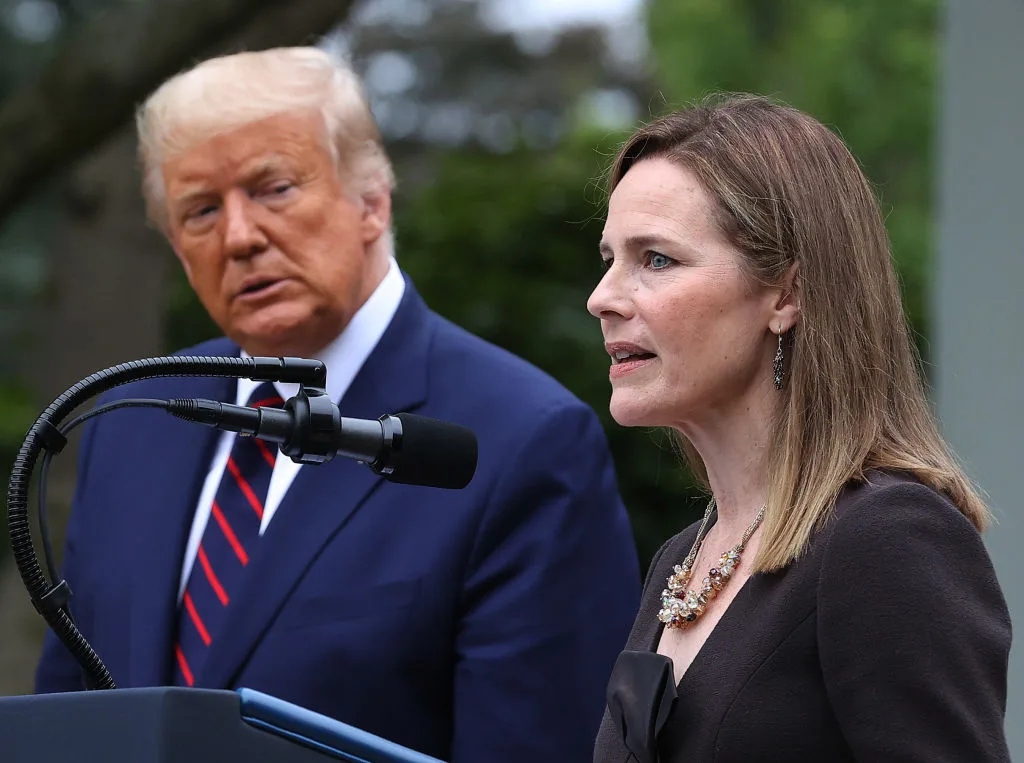
LGBTQ+ Rights
The Human Rights Campaign (HRC) is one of the many LGBTQ+ organizations who oppose Coney Barrett’s nomination to the Supreme Court. Upon her nomination, the HRC released the following statement by Alphonso David, president of the Human Rights Campaign:
“The last four years have been an assault on the rights and dignity of LGBTQ people across the country, led by Donald Trump, Mike Pence and Mitch McConnell’s prioritization of power over people. While people are suffering across the country, instead of offering aid, Trump and McConnell are rushing through a Supreme Court justice—a justice who could deal a fatal blow to people maintaining their basic health care in the middle of a pandemic. The President has dramatically altered the judiciary to try to dismantle hard-fought rights and progress secured over decades—LGBTQ rights, voting rights, reproductive rights and more. Meanwhile, Mitch McConnell has sycophantically installed Trump’s extreme judicial nominees and is now seeking to push the balance of the Supreme Court even further to the fringes. If she is nominated and confirmed, Coney Barrett would work to dismantle all that Ruth Bader Ginsburg fought for during her extraordinary career. An appointment of this magnitude must be made by the president inaugurated in January. The Human Rights Campaign fervently opposes Coney Barrett’s nomination, and this sham process.”
The press release also directly states Coney Barrett’s rulings that discriminate against the LGBTQ+ community:
“Coney Barrett has demonstrated hostility toward LGBTQ rights in her words and rulings. She defended the Supreme Court’s dissenters on the landmark marriage equality case of Obergefell v. Hodges, questioning the role of the court in deciding the case. She said Title IX protections do not extend to transgender Americans, claiming it’s a ‘strain on the text’ to reach that interpretation. She misgendered transgender people, referring to a transgender women as ‘physiological males,’ while casting doubt on transgender rights.”
On November 4, the Supreme Court will hear Fulton v. City of Philadelphia, which “considers whether governments must allow taxpayer-funded organizations to discriminate against LGBTQ people when providing critical services,” per the HRC. This will, like many cases to come in front of the Supreme Court, have the opportunity to drastically affect the livelihood of LGBTQ Americans.
You can read more on how Coney Barrett ruled on past decisions related to the LGBTQ+ community here.
Gun Safety
Should Coney Barrett be nominated, there will likely be an increase in Second Amendment-related cases brought to the Supreme Court. In a 2019 dissent, Coney Barrett said that people with felony convictions should be able to own a gun, but they still shouldn’t be able to vote. “History does not support the proposition that felons lose their Second Amendment rights solely because of their status as felons,” she wrote. “But it does support the proposition that the state can take the right to bear arms away from a category of people that it deems dangerous.”
How Can I Take Action?
While the confirmation of Coney Barrett is likely inevitable, there are a few ways to voice your dissent and prepare for next steps:
- Contact your senators today and demand that they vote “no” on Coney Barrett’s nomination. (You can see where senators stand on voting for a Supreme Court nominee during an election year here.)
- Help flip the Senate blue and donate to the following campaigns, if you have the means (any amount helps):
- Jaime Harrison who is running against Senator Lindsey Graham (R-SC)
- Amy McGrath who is running against Senator Mitch McConnell (R-KY)
- MJ Hegar who is running against Senator John Cornyn (R-TX)
- John Hickenlooper who is running against Senator Cory Gardner (R-CO)
- Theresa Greenfield who is running against Senator Joni Ernst (R-IA)
- Mark Kelly who is running against Senator Martha McSally (R-AZ)
- Sara Gideon who is running against Senator Susan Collins (R-ME)
- Raphael Warnock who is running against Senator Kelly Loeffler (R-GA)
- Paula Jean Swearengin who is running against Senator Shelley Moore Capito (R-WV)
- Cal Cunningham who is running against Senator Thom Tillis (R-NC)
- Steve Bullock who is running against Senator Steve Daines (R-MT)
- Jon Ossoff who is running against Senator David Perdue (R-GA)
- Barbara Bollier who is running against Rep. Roger Marshall (KS-01)
- Marquita Bradshaw who is running against former U.S. Ambassador to Japan Bill Hagerty
- Merav Ben-David who is running against former U.S. Representative Cynthia Lummis
- Review the Reproductive Health Blueprint, created by a coalition of reproductive health groups, that proposes critical reproductive health policy goals. Additionally, you can take a look at the impact of the domestic gag rule against Title X-funded abortion clinics imposed in 2019 by President Trump.
- Donate to Power to Decide’s Contraceptive Access Fund to help low-income women access contraception.
- Vote. Take two minutes to register here.
This article originally appeared on marie claire U.S.
